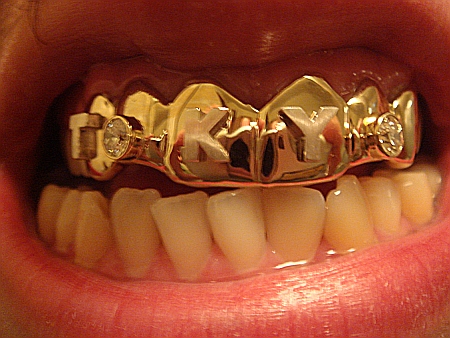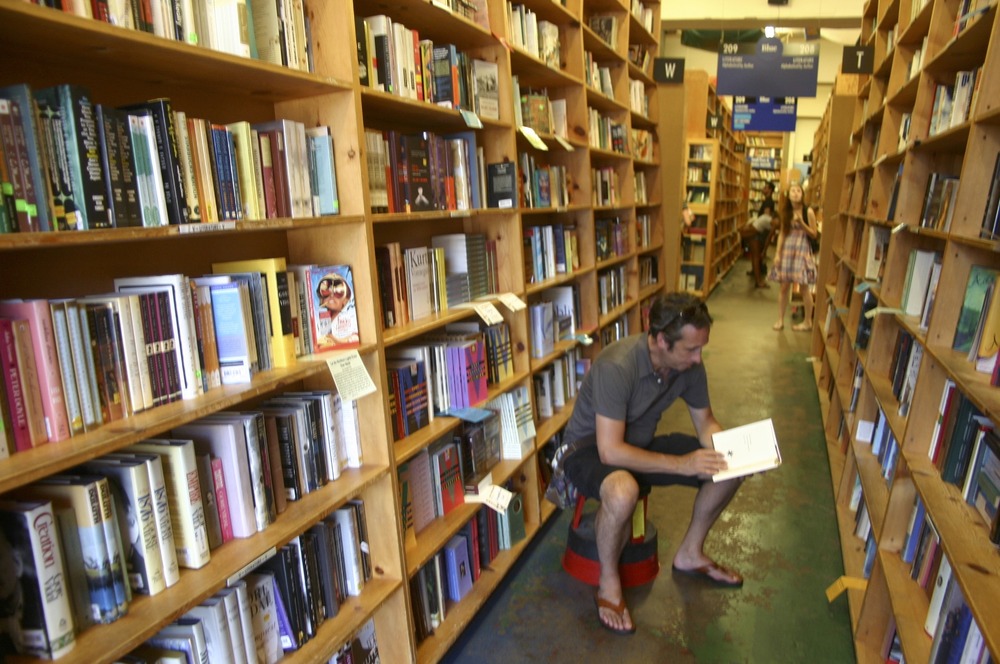Sign o' the Times
 Wednesday, September 28, 2011 at 8:57AM
Wednesday, September 28, 2011 at 8:57AM
 The other evening the doorbell rang. When I went to go see who it was, I found a balding salesman with an awful set of teeth. He had come to my door before several months earlier trying to hawk a membership to a chain of restaurants and probably assumed that I didn’t remember him from all the other salesmen that come a-knocking at my door. Or, perhaps he just didn’t remember me.
The other evening the doorbell rang. When I went to go see who it was, I found a balding salesman with an awful set of teeth. He had come to my door before several months earlier trying to hawk a membership to a chain of restaurants and probably assumed that I didn’t remember him from all the other salesmen that come a-knocking at my door. Or, perhaps he just didn’t remember me.
That happens a lot--my remembering people but not being remembered in return, so much so, it used to get me down.
I long suspected that the reason I was being forgotten was that I was failing to leave an impression strong enough on the people I met. Obviously, what I needed to do was to assert myself more. I needed to be a go-getter, a hustler with a powerful handshake and a ready smile! That is, at least, what my father used to grumble to me about when I was growing up. A niggling doubt has remained with me ever since. (Let's call it my legacy.)
But, then, my wife offered up an alternative theory: “The reason people don’t remember you is because they’re not very bright. They simply haven’t got as good a memory as you do.”
She said to me this after I had finally gotten ‘round to meeting a new friend of hers named Laura.
The two of them had met a few months earlier at a local park where they had brought their children to play. Before long, they were meeting for coffee and having lunch together. One day, my wife showed me a picture of Laura and all the things she had mentioned about the woman came together.
“I know her,” I said. “We met about ten years ago and chatted briefly. We were never friends, but we knew many of the same people. She might even know me.”
“She said she didn’t.”
“Did you show her a picture of me?”
“Yes, and she said she still didn’t know me.”
Granted, as the sexy, vivacious and outgoing Filipina that she was, Laura was going to leave more of an impression on people than a brooding and quiet undiscovered author like me ever would. Still, there really weren’t that many foreigners living in Fukuoka at the time. Even if we hadn’t met and chatted all those years ago, she could have at least remembered my face. Not the most handsome one, I suppose, but certainly not a monstrosity.
So, be it.
It goes without saying that I felt much better after my wife paid me that compliment and I can stand a little taller now when I meet someone for the second time who says, not as a question, but as a statement of presumed fact: “We haven’t met, have we?”
 So, the salesman at the door says he’s sorry to disturb me, but do you have time?
So, the salesman at the door says he’s sorry to disturb me, but do you have time?
I tell him I don’t.
He continues speaking all the same. What has he got to lose?
To my surprise, he does not have anything to sell me today. He is, instead, willing to pay good money for old jewelry.
“Have you got any gold or platinum lying, say, in the back of a drawer or in your closet?”
“’Fraid not,” I say, closing the door.
Gold. Now, if you want to see something (choose the adjective most appropriate to your emotional and financial circumstance: amazing, shocking, exciting, disgusting, frightening, etc.), go check the meteoric rise in the price of the spot gold over the past five to ten years. Up and up and up she goes, when she’ll drop nobody knows. Those in the business of selling gold will have you believe that the price will continue to climb indefinitely. Maybe they’re right. Personally, I believe that so long as the economic situation remains unpredictable, investors will continue to purchase gold in lieu of other investments as a store of value, meaning the price will probably rise further. Some argue the price will rise as high as $2,300 per ounce this year. (It hovered around $1,800 earlier this month.) That said, buying gold as an “investment” doesn’t make much sense. As the Economist wrote in 2010, “it pays neither a dividend, like a share, nor a coupon, like a bond, nor a rent, like property.”
Contrary to what I told the gold buyer, I do own gold. Quite a bit of it, actually, in bullion and coin. I started purchasing gold regularly about five years ago when prices were half what they are today. My reason for doing so was not as an investment--although it has been mildly entertaining to watch the price shoot up over the years--but rather as insurance.
I am not so much a pessimist as I am wary. It is not inconceivable that Japan’s economy collapse one day under the weight of public debt and the yen loses much of its value, or that China decides to gain, by military force, access to the frozen methane or other natural gasses under the waters lying in Japan’s exclusive economic zone, or that a desperate North Korea lobs several Taepo Dong missiles at the country, or that Japan is incapacitated by another cataclysmic natural disaster. And, I don’t want to be stranded, unable to return to the States or wherever it is I would flee to, when that days comes. Hence the gold.
Better safe than sorry, as the saying goes.
In Lebanon, it is not unusual for families of means to keep a horde of cash in a variety of currencies (as well as AK47s and ammunition) in case civil war breaks out again--always a possibility--or Israel with its itchy trigger finger--decides to bomb. (Few people in the west are unaware of the frequency of Israeli air strikes against, and incursions into, the country.) Seeing how my relatives there prepared for such possibilities impressed me the last time I visited and I started thinking more seriously about my own family’s security.
Another sign of the times came via a fax--yes, a fax--that arrived the very same evening. (The only reason I have a fax machine is because people still insist on sending documents that way.) It was sent by the Recruit company, a classified, publishing, and human resource giant here in Japan. Recruit publishes a number of magazines, one of which is Keiko to Manabu. Literally meaning “Lessons and Learning”, the title of the magazine is a homonym of a woman’s name, Keiko, and a Man’s name, Manabu, lending it, I suppose, a friendly ring. The magazine is published regionally and features ads for all kinds of schools. If you want to learn, for example, how to put on a kimono (what the Japanese call kitsuke) you just thumb through the magazine to that section and look at the schools listed there and call one up.
I used to advertise in Keiko to Manabu. The first time I placed an ad in the magazine was about ten years ago. At the time, the only schools advertising in it were the major nation-wide Eikaiwa chains, such as Aeon, Geos, and Nova. Considering the cost of an ad, I could understand why. The cheapest ad, a dinky 1/8-page rectangle, cost about 70-80,000 yen per month.
But, my business at the time was suffering and I needed to do something different to get new students as the method I had been using was no longer effective. (Too many people were imitating me.) So, biting the bullet, I took out a series of ads with the magazine and crossed my fingers.
To my delight, the ad was a huge success so I continued using K&T for the next several years. Eventually, I managed to get the price down to 50,000 yen a month, which was still kind of expensive for a small operation like mine, but I could generally recoup the cost through new enrollment within a few months.
But then five years or so ago, the effectiveness of the ad started to peter out. One of the problems was the Nova bankruptcy, which put a damper on the entire English-learning market, another was the number of other small school owners who were once again following my modest lead. And so, I pulled my ads. (Incidentally, I have since eschewed print media entirely, sticking to the Internet where I seem to once again have the edge over my competition.)
In the years that I stopped advertising in K&T and a number of other magazines, I have watched with interest how the price of advertising in print media has come down, down, down. They can’t give the space away anymore. And that is what some of them do. One saleswoman called to say they had a space that had to be filled by tonight. How much, I asked. Ten thousand yen. “Ten thousand yen?" I said. "Deal!” I got three students out of that, two of whom studied for over three years, meaning a ten-thousand yen gamble on the advertising roulette table paid out over 25:1. Not bad.
Yesterday evening’s fax from Keiko to Manabu made a tempting offer and for the first time in years I seriously considered once again placing an ad in the magazine. One month’s advertising fee only cost five thousand yen. Five thousand yen! (I spend that much money on a bottle of rum.) In addition, they were throwing in advertising space on their online site for free. Such space used to go for about twenty-thousand a month.
In the end, I crumpled up the paper and tossed it into the garbage. Obviously, at prices that low the magazine no longer had the pull it once had. I might gain a student or two, yes, but I would probably gain five salesmen who would hound me into placing further ads in their magazine. No thanks.
Let me tell you, as much as I like watching the TV series Mad Men, advertising is not a business I would like to be in today.
 Hizbullah's attacks stem from Israeli incursions into Lebanon,
Hizbullah's attacks stem from Israeli incursions into Lebanon,  Keiko to Manabu,
Keiko to Manabu,  Lebanon,
Lebanon,  Recruit,
Recruit,  advertising your English school,
advertising your English school,  eikaiwa,
eikaiwa,  gold,
gold,  gold as investment,
gold as investment,  gold price,
gold price,  running an English school in Japan,
running an English school in Japan,  running an eikaiwa,
running an eikaiwa,  selling gold in Japan in
selling gold in Japan in  Doing Business in Japan,
Doing Business in Japan,  Economics,
Economics,  Japanese Companies,
Japanese Companies,  Living in Japan,
Living in Japan,  Teaching Life
Teaching Life 